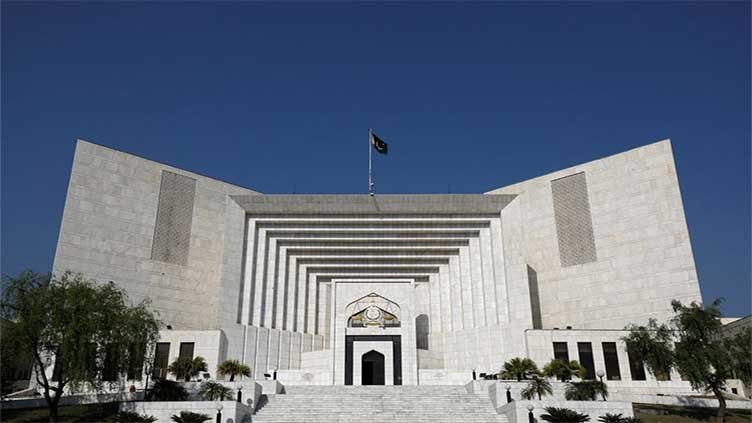Civilians trial: 'No provision in constitution mandates 11-month physical remand'

Pakistan
A seven-judge bench, led by Justice Aminuddin Khan, conducts proceedings
He narrated a quote of Maulana Abul Kalam that the greatest injustice occurs in the fields of war or in courts of justice
ISLAMABAD (Dunya News) – Hafeezullah Niazi, the father of one of the civilians whose cases are awaiting trial by military courts, raised the question before the Supreme Court on Monday that his son was on physical remand for 11 months which is against the constitution.
He appeared before a larger seven-member bench of the apex court which is hearing appeals against trials of May 9 arson accused in military courts with a copy of the constitution in his hand.
He narrated a quote of Maulana Abul Kalam that the greatest injustice occurs in the fields of war or in the courts of justice.
Niazi’s son Hassaan has been in jail for his alleged involvement in the May incidents. He requested the court to entertain his miscellaneous plea.
Justice Aminuddin said the bench is hearing appeals, it cannot entertain his plea as there will be more requests if his request is accepted.
Niazi told the bench that he met his son once on court’s intervention.
THE PROCEEDINGS
At the outset of hearing, PTI's lawyer Salman Akram Raja submitted that the families had not been allowed to meet the accused for five weeks.
Advocate Latif Khosa said the accused had been kept in bad conditions.
Justice Mandokhail asked him that if the meetings had not taken place for five weeks, how he came to know that the accused have been kept in bad conditions.
Advocate Khosa replied that those who met earlier said the hands of the accused were tied behind their back.
Later, Attorney General Mansoor Awan came to the rostrum. He expressed his surprise that why the families are not allowed to meet the accused because the issue had been resolved.
He submitted that if the [government’s] appeal is admitted, the accused will be able to appeal against the decisions. They will be able to approach the high courts and the Supreme Court in addition to the military courts.
Justice Mandokhail remarked that the place where Jinnah Sahib [Quaid-i-Azam] spent last days of his life was set to fire.
He asked the Advocate General for Balochistan, who filed an appeal against the decision of the military courts, that does he want a parallel judiciary?
Justice Shahid Waheed asked him about the scope of appeals in the light of the decision of Justice Mansoor Ali Shah in the practice and procedure case.
Can we hear the provinces in such an appeal, Justice Waheed continued.
He asked Advocate Hamid Khan how his request to be a party to the case can be heard. On this, the lawyer replied that he requested to become a party on behalf of the Lahore High Court Bar Association.
Justice Mandokhail said he (Hamid Khan) could be amicus curiae in the case. Why do you want to become a party on behalf of the Bar?
Advocate Hamid Khan replied that the Bar had its own position on the matter. Justice Mandokhail remarked that if that was the case, he should have been a party when the case started.
Justice Waheed remarked that even the provinces should not have been heard in the intra-court appeals. Justice Mandokhail told Advocate Hamid Khan don't waste time, let the case proceed.
Later, the court sought Advocate Faisal Siddiqui’s opinion on the request of Hamid Khan. But he excused himself and said that he had filed a separate application for live telecast of the case.
Justice Aminuddin said the facility of live broadcasting is only in Court Room One.
Later, Faisal Siddiqui withdrew the request to telecast the hearing live. He said the court should decide the case soon, I do not follow such a request.
Later, the court approved Hamid Khan's request to become a party by a 5-2 majority.
On this occasion, the decision of Justice Mansoor Ali Shah regarding the intra-court appeal was read by the attorney general in court.
Justice Waheed inquired him whether the court was hearing the appeal as a “review” or as a full appeal.
He observed that the Supreme Court was supposed to make rules related to intra-court appeals by now. Intra-court appeal cannot be combined with the Law Reforms Act.
Justice Waheed observed that the points which were not raised before the bench which decided the original case cannot be added in the arguments.
He questioned the attorney general that he argued that cabinet approval should have been sought when the Khyber Pakhtunkhwa government withdrew its appeal. Did the provinces who filed appeals get approval from the cabinet?
The attorney general said that in his view, cabinet approval was not required for appeal.
The court directed him to ensure meetings of the family members with the accused.
Later, the court adjourned the hearing of the case till July 11.
THE BENCH
It may be recalled that the seven-judge bench, headed by Justice Aminuddin Khan, which is hearing appeals, inculdes Jamal Khan Mandokhail, Muhammad Ali Mazhar, Hasan Azhar Rizvi, Shahid Waheed, Irfan Saadat and Shahid Bilal.
In October last year, a five-member larger bench declared null and void the trial of 102 civilians involved in the May 9 incidents in military courts.


